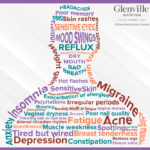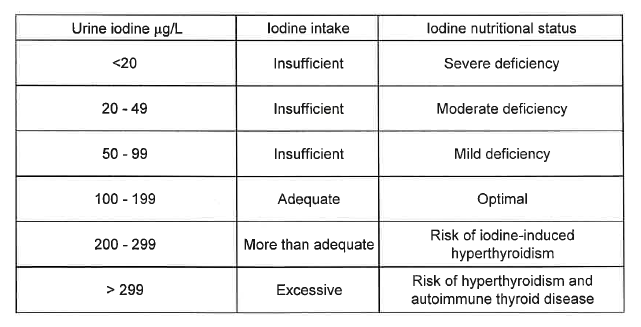 Iodine is essential for thyroid function. It is taken up into the thyroid gland from the bloodstream where it joins to thyroglobulin within the thyroid tissue to form thyroid hormones. Three iodine molecules join to form T3 or tri-iodothyronine and four molecules are added to form T4 or thyroxine. These hormones are then released from the thyroid gland back out into the bloodstream where they have wide reaching effects on every system in our body.
Iodine is essential for thyroid function. It is taken up into the thyroid gland from the bloodstream where it joins to thyroglobulin within the thyroid tissue to form thyroid hormones. Three iodine molecules join to form T3 or tri-iodothyronine and four molecules are added to form T4 or thyroxine. These hormones are then released from the thyroid gland back out into the bloodstream where they have wide reaching effects on every system in our body.
Thyroid disease symptoms and causes
 Thyroid function might be directly or indirectly related to almost all symptoms of chronic illness; digestive issues, immune imbalances, mental health problems, joint or skin issues, metabolic disturbances, fertility issues and many more. This is why all of our patients are screened for thyroid conditions. Thyroid disease is most often mediated by autoimmune antibodies, which means we need to calm down the immune system. Even if you do not currently have antibodies, restoring thyroid function and protecting against further damage is key to long term thyroid health.
Thyroid function might be directly or indirectly related to almost all symptoms of chronic illness; digestive issues, immune imbalances, mental health problems, joint or skin issues, metabolic disturbances, fertility issues and many more. This is why all of our patients are screened for thyroid conditions. Thyroid disease is most often mediated by autoimmune antibodies, which means we need to calm down the immune system. Even if you do not currently have antibodies, restoring thyroid function and protecting against further damage is key to long term thyroid health.
Sources of iodine
Sources of iodine in the diet include fish, seafood, dairy and seaweed products. However the quantity of iodine can vary greatly, with some seaweed products like kelp potentially contributing far too much iodine than is helpful. Iodine deficiency was prevalent worldwide, in developed countries and developing nations alike. Many countries including France, Denmark, Australia, China and the US have major fortification programmes to overcome this deficiency. These are not present in the UK and Ireland so deficiency is common.
Effects of too much or too little iodine
You might expect excess iodine to fuel hyperthyroidism (over active) and deficiency to result in hypothyroidism (under active). However this is not always the case. In conditions of excess iodine, the thyroid gland adapts to put the brakes on thyroid hormone production. However, over a prolonged period, this adaptation damages the tissue ultimately resulting in tissue damage, thyroid antibodies and hypothyroidism.
Under conditions of mild deficiency, the thyroid also adapts. It is very effective at scavenging all available iodine, even from other tissue sources like the salivary gland and breast tissue where iodine may function to reduce cell growth and risk of breast cancer. Again, this puts the thyroid under strain and hypothyroidism will eventually ensue if the deficiency is more severe or prolonged. Tissue damage results in inflammation and production of thyroid antibodies.
Test don’t guess
We have published a medical recommendations paper in 2018 to advise doctors and other health care professionals on the best way to measure iodine. We use a measurement of urine iodine, under careful instruction to minimise variation. In addition, we will talk to you about your dietary intake. It is very important to measure your levels before taking any supplements containing iodine as taking too much can have a very negative effect.
The optimal range is between 100 and 200 ug/L, although this is higher in pregnancy for optimal thyroid function. We commonly see patients in the range of moderate deficiency, between 20-50 ug/L.
Supplementation
It is very important to take the right dosage of iodine. If you take too much too quickly, you can easily overwhelm your thyroid and cause even more tissue damage and increase thyroid antibodies. High doses can be found in very common supplements that are readily available. If you are already taking thyroid medication, or trying to conceive, it is even more important to be cautious.
If you would like more information about the services we offer, including testing, please get in touch.


